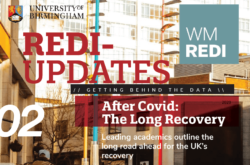In this blog, Alex Smith from the West Midlands Combined Authority looks at what data can tell us about where in the education and skills system, social mobility is the strongest, and where it is weakest. This blog is an introduction to the WM REDI project “Understanding and Addressing Skills Impacts and Needs“. The project … Continue reading “A First Look at Quantifying Skills Pathways”
Category: Education
The Impact of the COVID-19 Crisis on Childcare and Implications for Participation in the Labour Market
In this blog, Dr Sara Hassan looks at the impact of COVID-19 on the childcare sector, a sector already facing significant challenges before the pandemic, which then saw a massive drop in usage when lockdowns began. Since lockdown, many working parents have experienced difficulty in being able to work with some childcare providers closing their … Continue reading “The Impact of the COVID-19 Crisis on Childcare and Implications for Participation in the Labour Market”
Labour Market Challenges: The Impact of COVID-19 on Ethnic Minority Groups in Birmingham
Professor Anne Green discusses the labour market challenges ethnic minority groups in Birmingham faced before COVID-19 and how the virus has exacerbated these issues. This blog post has been produced to provide insight into the findings of the Birmingham Economic Review. The Birmingham Economic Review 2020 is produced by City-REDI / WM REDI, University of … Continue reading “Labour Market Challenges: The Impact of COVID-19 on Ethnic Minority Groups in Birmingham”
Lifelong Learning: A Current and Future Imperative
Welcome to REDI-Updates. REDI-Updates is a bi-annual publication which will get behind the data and translate it into understandable terms. In this edition, WM REDI staff and guest contributors will discuss some of the key topics when trying to understand the long-term economic impacts of the pandemic. In this article, Dr Abigail Taylor discusses the importance … Continue reading “Lifelong Learning: A Current and Future Imperative”
Has COVID-19 Changed the Terrain of Engagement?
Liam O’Farrell considers the impact of Covid-19 on civic engagement: Will the pandemic make authorities more interested in digital public consultation? This blog is based on a report called “States of participation: International Best Practice in Civic Engagement“. Given that Covid-19 has only recently become part of our lives, there has not yet been a … Continue reading “Has COVID-19 Changed the Terrain of Engagement?”
The Impact of the COVID-19 Crisis on Older Workers
Professor Anne Green looks at the impact of the Covid-19 crisis and lockdown on the employment prospects of different age groups, focusing particularly on older workers and the challenges they face should they get made redundant. Introduction Much of the policy response in the wake of Covid-19 has focused on the plight of young people. … Continue reading “The Impact of the COVID-19 Crisis on Older Workers”
The Impact of the COVID-19 Crisis on Women
Professor Anne Green looks at the impact COVID-19 is having on the lives of women in the West Midlands, especially those from BAME groups. Introduction This commentary draws in particular on two reports relating to the impact of Covid-19 on women and with a particular focus on the West Midlands. The first report from the … Continue reading “The Impact of the COVID-19 Crisis on Women”
Informing Regional Recovery With Community Priorities: WM Citizens’ Panel
Anna Humphreys and Adam Hawksbee from the West Midlands Combined Authority explain why the West Midlands Recovery Coordination Group set up a panel of citizens to help with the recovery in the region, as well as the findings from the group, and what they prioritised. Over the past few months, the UK Government has asked an … Continue reading “Informing Regional Recovery With Community Priorities: WM Citizens’ Panel”
Commercialisation of University Research as a Pathway to Regional Growth
Welcome to REDI-Updates. REDI-Updates is a bi-annual publication which will get behind the data and translate it into understandable terms. WM REDI staff and guest contributors will discuss various topics, with this first publication focusing on how inclusive growth can be a tool to tackle regional imbalances across the UK. In this article, Dr Chloe Billing … Continue reading “Commercialisation of University Research as a Pathway to Regional Growth”
Helping NEET Young People Towards and Into Employment: Learning From Talent Match
In this blog, Professor Anne Green discusses Talent Match, a programme set up after the 2008 recession in response to rising unemployment, with the aim of supporting young people aged 18-24 years, especially those who are furthest from the labour market (and sometimes ‘hidden’ from mainstream support) to achieve sustainable employment and fulfilling lives. In … Continue reading “Helping NEET Young People Towards and Into Employment: Learning From Talent Match”










